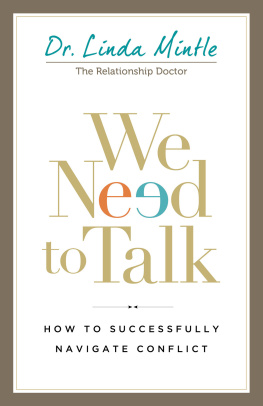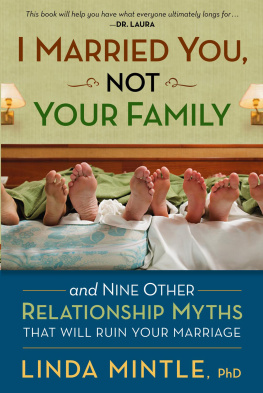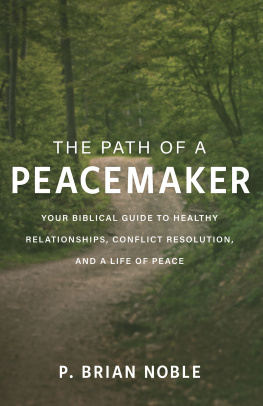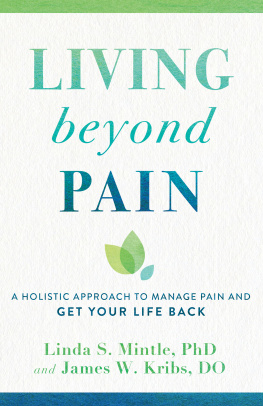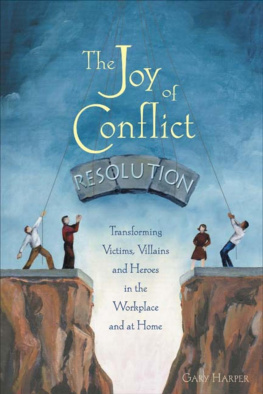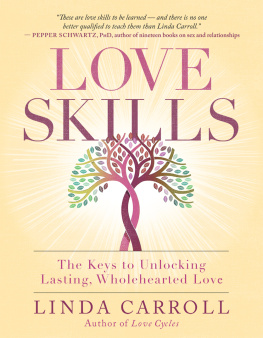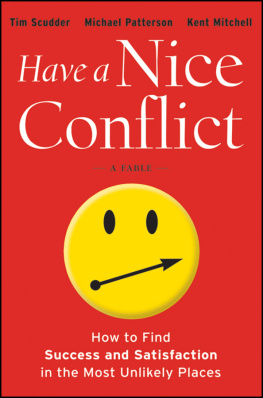Linda Mintle - We Need to Talk: How to Successfully Navigate Conflict
Here you can read online Linda Mintle - We Need to Talk: How to Successfully Navigate Conflict full text of the book (entire story) in english for free. Download pdf and epub, get meaning, cover and reviews about this ebook. year: 2015, publisher: Baker Books, genre: Home and family. Description of the work, (preface) as well as reviews are available. Best literature library LitArk.com created for fans of good reading and offers a wide selection of genres:
Romance novel
Science fiction
Adventure
Detective
Science
History
Home and family
Prose
Art
Politics
Computer
Non-fiction
Religion
Business
Children
Humor
Choose a favorite category and find really read worthwhile books. Enjoy immersion in the world of imagination, feel the emotions of the characters or learn something new for yourself, make an fascinating discovery.
- Book:We Need to Talk: How to Successfully Navigate Conflict
- Author:
- Publisher:Baker Books
- Genre:
- Year:2015
- Rating:3 / 5
- Favourites:Add to favourites
- Your mark:
- 60
- 1
- 2
- 3
- 4
- 5
We Need to Talk: How to Successfully Navigate Conflict: summary, description and annotation
We offer to read an annotation, description, summary or preface (depends on what the author of the book "We Need to Talk: How to Successfully Navigate Conflict" wrote himself). If you haven't found the necessary information about the book — write in the comments, we will try to find it.
Linda Mintle: author's other books
Who wrote We Need to Talk: How to Successfully Navigate Conflict? Find out the surname, the name of the author of the book and a list of all author's works by series.
We Need to Talk: How to Successfully Navigate Conflict — read online for free the complete book (whole text) full work
Below is the text of the book, divided by pages. System saving the place of the last page read, allows you to conveniently read the book "We Need to Talk: How to Successfully Navigate Conflict" online for free, without having to search again every time where you left off. Put a bookmark, and you can go to the page where you finished reading at any time.
Font size:
Interval:
Bookmark:
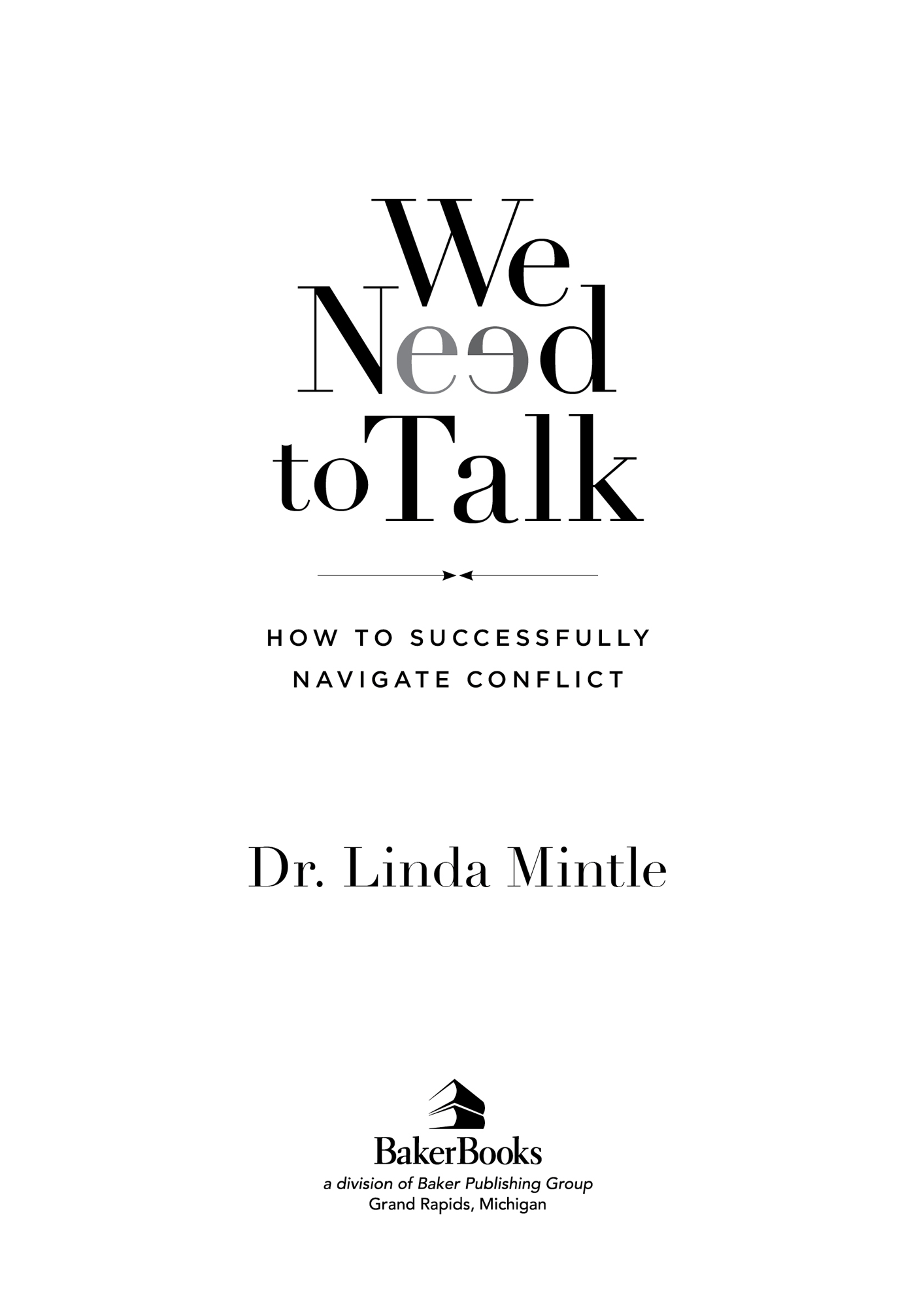
2015 by Linda Mintle
Published by Baker Books
a division of Baker Publishing Group
P.O. Box 6287, Grand Rapids, MI 49516-6287
www.bakerbooks.com
Ebook edition created 2015
All rights reserved. No part of this publication may be reproduced, stored in a retrieval system, or transmitted in any form or by any meansfor example, electronic, photocopy, recordingwithout the prior written permission of the publisher. The only exception is brief quotations in printed reviews.
Library of Congress Cataloging-in-Publication Data is on file at the Library of Congress, Washington, DC.
ISBN 978-1-4412-2238-1
Unless otherwise indicated, Scripture quotations are from the Holy Bible, New International Version. NIV. Copyright 1973, 1978, 1984, 2011 by Biblica, Inc. Used by permission of Zondervan. All rights reserved worldwide. www.zondervan.com
Scripture quotations labeled ESV are from The Holy Bible, English Standard Version (ESV), copyright 2001 by Crossway, a publishing ministry of Good News Publishers. Used by permission. All rights reserved. ESV Text Edition: 2007
Scripture quotations labeled Message are from The Message by Eugene H. Peterson, copyright 1993, 1994, 1995, 2000, 2001, 2002. Used by permission of NavPress Publishing Group. All rights reserved.
Scripture quotations labeled KJV are from the King James Version of the Bible.
Scripture quotations labeled NKJV are from the New King James Version. Copyright 1982 by Thomas Nelson, Inc. Used by permission. All rights reserved.
This book is not intended to provide therapy, counseling, clinical advice, or treatment, or to take the place of clinical advice and treatment from your personal physician or professional mental health provider. Readers are advised to consult their own qualified healthcare provider regarding mental health and medical issues. Neither the publisher nor the author takes any responsibility for any possible consequences from any treatment, action, or application of information in this book to the reader. Names, places, and identifying details have been changed to protect the privacy of individuals who may have similar experiences. The characters depicted here consist of composites of a number of people with similar issues, and the names and circumstances have been changed to protect confidentiality. Any similarity between the names and stories of individuals described in this book to individuals known to readers is purely coincidental.
To my many mentors in the marriage and family therapy field who taught me the benefits of confronting conflict to grow relationships. To my original family, who confronted conflict straight on but loved each other always. And to my current family who has grown and loved through confronting issues and teaching each other what it means to accept each other unconditionally.
Cover
Title Page
Copyright Page
Dedication
Acknowledgments
Introduction: We Need to Talk
1. Conflict: You Cant Get Around It
2. Can We Trust Each Other?
3. Id Rather Not Talk
4. Differences Make a Difference
5. Living Under the Cloud of Negativity
6. A Clash of Styles
7. Solvable and Unsolvable Problems
8. All in the Family
9. Parenting, Divorce, and Blended Families
10. Sex, Affection, and Conflict
11. Dealing with Difficult People
12. Anger and Resentment
13. Forgiveness
14. We Can Work It Out
Final Thoughts: Navigating the Storms
Notes
About the Author
Back Ads
Back Cover
Special thanks to:
Norm, for supporting my time and attention to writing.
Zoe, for sitting on the chair for hours while I was writing.
Dr. Jason Wells and Dr. Tony Panettiere, for checking my neuroscience.
All the couples and families I have treated over the years who helped me practically understand the role of conflict in relationships.
Wes Yoder for believing in the writing I do and encouraging me to continue.
And thanks to the Baker Books team for their work on this book and belief in my writing.
We Need to Talk
We need to talk...
Uh -oh, somethings wrong.
Im in trouble.
Oh no , not again.
What did I do this time?
This is going to be a long night!
Here we go again .
Its amazing how these four short words can stop a conversation and grip us with momentary anxiety. Lets be honest, these words usually mean something is wrong and we are about to go into the world of feelings, a place not everyone likes to visit. If you are smart, you wont begin a conversation with these four words. The phrase We need to talk puts most of us on the defensive.
We need to talk takes time and energy. It can be exhausting and doesnt always end with a quick fix. But the idea behind We need to talk is important to making our relationships work. Its our cue that something needs to be addressed.
How do you respond to these four words? Do you embrace the idea or run for the hills? One reason this phrase makes our hearts skip a beat is because so many of us are uncomfortable working through relationship conflicts. For whatever reasons, we dont have the confidence that we can face conflict without causing more problems. And we dont like the way conflict makes us feel.
The opportunity for conflict exists moment by moment in many different forms. Think about the number of times a day we are faced with conflict. The daily news is filled with international conflictsgroups that cant get along, wars, fighting over resources, and more.
Workplace conflict is so common that consultants and special teams are often brought in to help with team building and conflict resolution. Seminars are offered to build emotional EQ, discover job fit, and understand organizational culture. Mediators work with teams to help them get along and be more productive.
Social conflict is embedded in ideologies, habits of other people, and cultures. It usually involves a struggle for power and is chronicled in stories like John Steinbecks The Grapes of Wrath , the story of the hardship and oppression of migrant workers during the Great Depression, or Ralph Ellisons Invisible Man that takes on the segregated American South of the early part of the twentieth century and documents the struggles of being black and American.
There are physical conflicts like man against the great whale in Melvilles Moby Dick or man struggling for survival in Daniel Defoes Robinson Crusoe . In recent years, conflicts over aid distribution to survivors of hurricanes, earthquakes, and other natural disasters make global news.
Spiritual conflicts are less acknowledged but are real and related to disobedience and rebellion against God. Darkness may oppress the mind. Spiritual strongholds of ignorance, prejudice, lust, false argument, conceit, etc., may take hold.
Conflict can arise within a person as they battle personal demons like addictions and mental illness. Or it can emerge when a person acts in a manner not consistent with their beliefs, like the woman who lives with her boyfriend and believes this is morally wrong or the man who cheats on his taxes and knows this violates the law and his conscience.
Conflict is woven into our daily lives. It shows up oftenin political arguments, disagreements with co-workers, fights with siblings, and marital bickering. Its consequences can bring the end of a marriage, friction between friends, or the loss of a job. Thus, this ever-present conflict can keep us stuck or it can provide growth in our relationships. To deal with conflict, we do need to talk.
Font size:
Interval:
Bookmark:
Similar books «We Need to Talk: How to Successfully Navigate Conflict»
Look at similar books to We Need to Talk: How to Successfully Navigate Conflict. We have selected literature similar in name and meaning in the hope of providing readers with more options to find new, interesting, not yet read works.
Discussion, reviews of the book We Need to Talk: How to Successfully Navigate Conflict and just readers' own opinions. Leave your comments, write what you think about the work, its meaning or the main characters. Specify what exactly you liked and what you didn't like, and why you think so.

